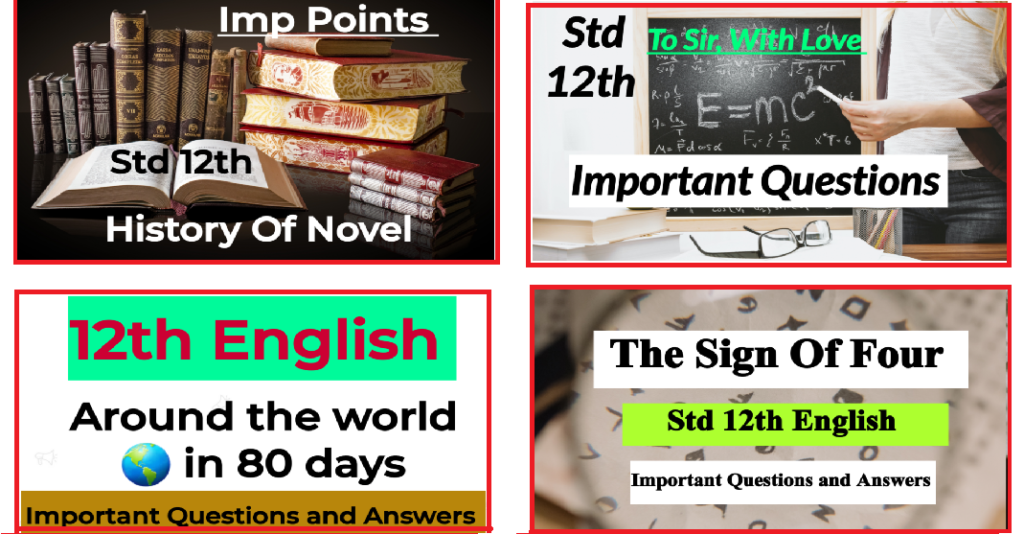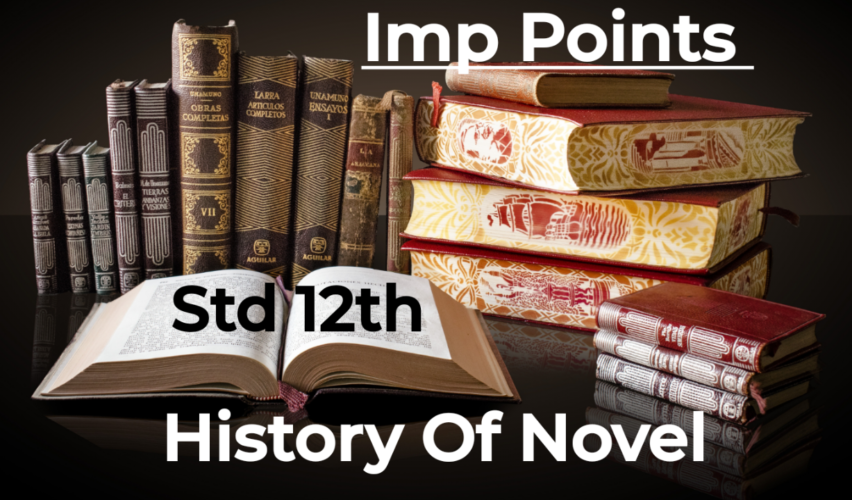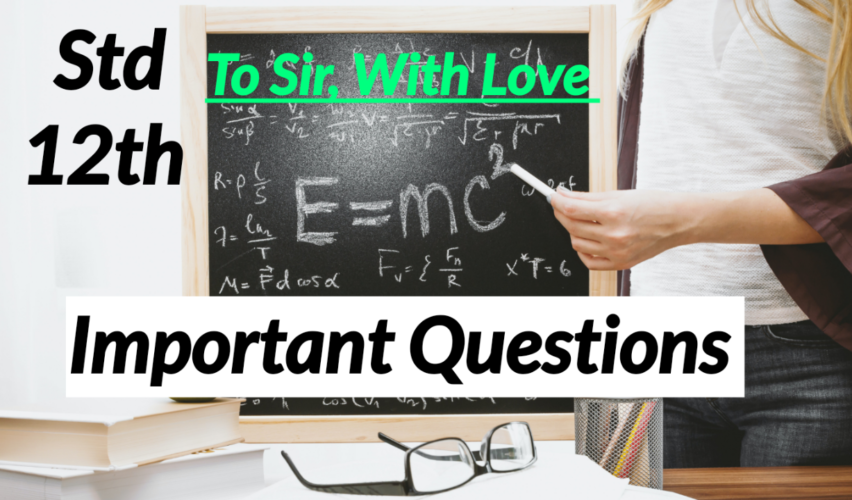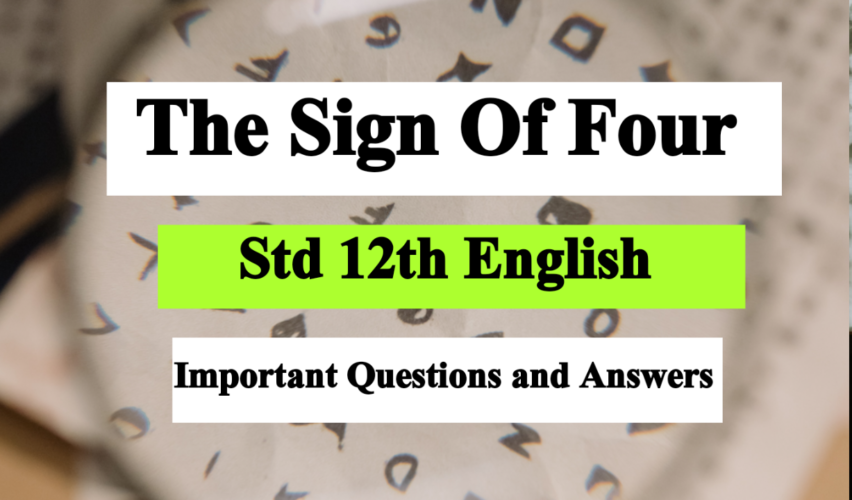Std.XII English | Novel 1 | History of Novels (Important Points Notes)


Main Points
‘Novel’ this word is derived from Italian word ‘novella’ means new. Name of novelist Novel | |||||||||||||
| 1] | Virgil’s | Ecologues | |||||||||||
| 2] | Malory’s | Morten De Arthur. | |||||||||||
| 3] | Geoffrey Chaucer | The Canterbury Tales | |||||||||||
| 4] | Murasaki Shikibu’s the world’s first novel | “ Tale of Genji’ | |||||||||||
| 5] | Miguel de Cervantes | Don Quixote, European first novel | |||||||||||
After 1740, Novel originated as the literary form in England . | |||||||||||||
| 6] | John Bunyan’s | The Pilgrim’s progress | |||||||||||
| 7] | Aphra Behn | Oroonoko | |||||||||||
| 8] | Jonathan Swift’s | Gulliver’s Travel | |||||||||||
| 9] | Samuel Richardson | Pamela, Virtue Rewarded, Clarrisa | |||||||||||
| 10] | Immigrant authors | Salman Rushdie V.S Naipul, Kazno Ishigura | |||||||||||
| 12] | Francs Burney ( Woman Novelist) | Evelina | |||||||||||
| 13] | Mary Shelley (woman novelist) | Frankenstein | |||||||||||
| 14] | Bronte sisters( woman novelist) | The wuthering Heights, Jane Eyre. | |||||||||||
| 15] | Virginia Woolf | Pioneer of stream of consciousness | |||||||||||
| 16] | Agastha Christie | Miss Marple ,Herculin Poirot (novel based on crime) | |||||||||||
| 17] | Bankim Chandra chottopadnya (INDIAN NOVELIST) | Rajmohan’s wife (First novel in English by an Indian) | |||||||||||
| 18] | Famous Novella (shorter than novel and longer than short story)
| The Heart of Darkness by Joseph Conard
| |||||||||||
Elements of Novel/ Novella | Elements of Novel 1 Theme – It is the central idea of Novel. Factors are related to each other by the author |
2 Plot – It is the story that make up the theme. It may be simple or complex. | |
3 Character – Protagonist, is the main character , antagonist can be called as villain who conflicts with the protagonist | |
4 Setting – It is the background in which the story takes place, it includes place , period , time, climate , weather and lifestyle. | |
5 Conflict ; It is the struggle between the opposite forces in the story. It invites interest and curiosity in the novel. | |
6 Language/style – language and technique used the author for the course of events is known as style. | |
| Types of Novel | Types of Novels 1 Realistic Novel. It gives effect or realism which is also called as novel of manner. The characters in this novel interact with other characters and experience daily events. |
2 Picaresque novel (Picaro- means dishonest) Here the main character or protagonist is eccentric or disrespectful person but active in adventures. | |
3 Historical novel Such novel is a novel which is set in a period earlier than that of writing. | |
4 Epistolary Novel Epistolary means letter. Letters are the most common basis of such novel, diary entries are also a popular form of such type. | |
5 Gothic Novel Such novel is based on terror, mystery, horror, thriller or haunted buildings. | |
6 Autobiographical Novel ( Such novel is based on the life of author in first person). It may or may not be in the first person | |
7 Allegorical Novel (surface meaning is different from symbolic meaning) | |
8 Utopian Novel/Dystopian Novel It is mostly science or speculative fiction related to imaginary community | |
9 Psychological Novel (internal life of protagonist) | |
10 Stream of consciousness William James coined this term in his Principles of Psychology. Here the novelist narrates them as they enter the mind of the character. | |
11 Bildungsroman Novel (growth) Such novel is Concerned with the growth of the protagonist’s Mind |
Std.XII | English | Novel 2 | To Sir, With Love

Q.1 Ferman was innovative and dramatic in his presentation. Justify.
Ans: When Ferman came on the stage , he signaled someone off stage. Two of his friends came with a skeleton. They were Welsh and Alison. They brought a skeleton with a sort of gallows. There was a skeleton hanging from a hook screwed into the top of its skull gently revolving at the end of the cord.
This invited a laughter from the audience.
Q.2 Half yearly report of the students council highlights the conduct of the narrators class. Justify.
Ans: Half yearly report justifies the efforts taken by the teacher and checks the digestion of knowledge among the students. The students came on the stage and represent themselves with their skill.
It starts from lower class to higher class. The narrator’s class was the last for the demonstration. His class performance was superb , miss Joseph talks about inter-depending of mankind. Potter showed his skill in mats. Ferman’s presentation was superb. Denham’s argument was appreciable.
In short the narrator was immensely satisfied with their performance
Q.3 Why was the writer anxious in the beginning of the programme?
Ans: In the beginning, the students troubled him a lot. They harassed him, bulled him and behaved arrogantly with him. In short, they didn’t respect him at all. Later on there were behavioral changes in them. They were well trained. They respected the teacher , followed his instructions. It was a great challenge for the narrator to tackle them but lastly, he was successful.
The annual programme was the proof to test to skill of students.
Their presentation would be a testing of the narrator’s efforts.
That’s why he was anxious.
Q.4 Miss Philips effectively handled the questioning session. Justify.
Ans : Miss Philips was considered frilly and brainlessl by everyone but her tackling of Denham’s argument changed everyone’s opinion. Denham was not in favor of taking PT in the class. According to him, it is simply a waste of time. He was aggressive in his opinion. He is blunt ,critical and dominating in his behavior in that argument. Remaining two teachers on the stage couldn’t tackle the aggression of Denham but miss Philips tackled him skillfully.
She reiterated that the school has to make timetable considering all students. Such activities are helpful to them when they leave the school. She express her views confidently and skillfully. At last Denham moves back in argument.
Q.5 Give brief character sketch of :
a) Denham:
He is one of the most influential character of the novel. He is the compere of the of the programme. He tackles the stage with great skill. He is well mannered. He calls the girls as miss and performs all the stage activities with good etiquette. His argument on PT games shocks everyone. He stress-fully points that PT games are simply waste of time and expresses his opinion with good command.
Initially his tone is blunt and aggressive but later on he accepts his defeats politely.
2) Miss Philips
Miss Philips was earlier considered as frilly and brainless but her stage presentation while tackling Denham changed everyone opinion. All came to know that she is well informed. When the two teachers on the stage showed helplessness while tackling Denham, miss Philips stands like a rock with her authority. She reiterates that school activities are prepared respecting all the students and PT’ is no exception. When students leave the school, they realize its importance . She was very confident to challenge Denham’s remarks, he was very critical and blunt but miss Philips was cool and Patient.
Std.XII English | Novel 3 | Around The World In 80 Days

Around The World In 80 Days
Important Questions From Exam point of view
Q. 1 Explain the line from the the light of the extract of the Novel
Q Quitters never win and winners never quit
Ans: This line perfectly suits Fogg, he is the best example of determination and stubbornness. Firstly he accepted the challenge which seems to be highly incredible , no one can imagine to move around the world in 80 days. When he is arrested, he doesn’t lose hope. After getting released , he tries every effort to reach London by arranging special train. When Passepartout tells him that today is Saturday, he rushes headlong to the Reform Club. Every time he has positive approach of winning and tries all his best to achieve success and lastly he comes out as winner.
Q . Time is the only solution to problems
Ans; Here time plays a great role and throughout the novel it rules. Firstly Fogg accepts the challenge against time, when he reaches Liverpool within time, he is arrested. When he gets released , he loses the train by just half hour. He loses the bet by five minutes. He remains at home respecting the condition , again he is informed that it is Saturday. He wins the bet just by some seconds. In this way , we observe the role of time every time, sometimes it cheats, sometimes it pleases. In this way we have to admit that time plays hide and seek with us and we have to give time to get time
Q. 2 Write the central idea of the given extract of the novel ‘ Around the world in 80 Days’
Ans: The central idea of the novel moves around the hide and seek of the influence of time. It shows how Fogg wins the incredible bet of moving around the world in 80 days. He has to face many obstacles while challenging the race but lastly succeeds in his mission. This novel emphasizes the power of time and its role. It also depicts a great message that love and affection is more important than money and any other gains of life.
Q. 3 Write in brief the theme of the extract
Ans: The greatest role is played by Time and it is the greatest theme of the novel. Phileas Fogg accepts the incredible wager or bet , tries all his best to win the bet but time cheats his every time , sometimes shows pleasure and sometimes pain. He arrives in time at Liverpool but cannot continue the journey . Again he gets released , tries to catch the train but he missed it by some minutes. Catching a special train he reaches London but lost the race by five minutes inviting failure for him. Again he came to know that it is Saturday, he rushes to the Reform Club and wins the bet just for a few seconds.
Q 4 Explain the thrilling climax of the novel
Ans: When Passepartout was sent to call the priest for the wedding, he came with the shocking news that it was Saturday whereas they considered it as Sunday. They gained one day while traveling towards the East . Actually they reached the destination prior to time but unknown to it , they lamented over the loss. When Passepartout came with the reality announcing that they can win the bet, they rushed to the Reform Club and succeeded in fulfilling their goal . In this way, time gave fruit of Fogg’s efforts and determination.
Q .5 Write character sketch of the following
1 ) Philleas Fogg: He is a man of self respect and discipline. He is a determined person and believes in doing incredible tasks as he accepts the wager which is almost impossible . He seems to be calm and patient. He respects the influence of time and believes in giving time to solve the crisis of time. He has a great patience while tackling challenges or problems. He never takes decision in excitement. He has tremendous self control and self dignity. He seems to be unselfish and generous. He gives priority to humanity , affection and love. He is not greedy for money. He is stubborn and determined to fulfill the challenges.
2) Passepartout: He is one of the most influential character of this novel. After Fogg , this characters shines with his skills and certain qualities. He is very loyal to his master. He dedicates his loyalty wherever it needs. He has loving nature , care for everyone. He takes care of his master in his crisis and maintains his calmness. He is very prompt as he runs to home announcing their mistake about the day. He is very unselfish as he doesn’t expect additional charges from his master. He is emotional as he cries for his mistake .
Std.12 | English | Novel 4 | The Sign Of Four | Imp Questions and Answers

The Sign Of Four
Important Questions and Answers
Q. 1 Write in brief the theme of the extract
Ans: The theme of the novel moves around the Agra treasure. All characters are centralized around it. Here Mary Morstan searches her father, she receives s pearl every year , later she receives a letter from an unknown writer about the meeting. Sherlock Holmes is requested to investigate the matter. Now the suspense continues with the deduction of Sherlock Holmes about the unknown writer. They go to that appointed place in search of the unknown writer of the letter
Q. 2 Write the central idea of the novel
Ans: The central idea of the novel is the meeting of Mary Morstan with Sherlock Holmes and Dr Watson, her concern about the letter she received , her narration of the pearls. She tells about her father, her visit to the hotel. It is also about Sherlock Holmes deduction from the handwriting , his guess about the writer. Later It tells about their visit to the destination of the unknown writer of the letter. It is also about Watson attraction toward Mary .
Q. 3 Describe the character of Mary Morstan from Dr Watson’s point of view
Ans: When I met Mary Morstan, she was in simple dress, she seems to be a person of limited talk. Her expressions were pleasant and cheerful. She seems to be emotional and sensitive. She may be around 27. Though she suffers a lot, she still maintains her cool attitude. Her eyes are sympathetic and because of her features and behaviour, I was greatly impressed
Q. 4 Sherlock Holmes is a leading character of the novel. Explain
Ans:It is absolutely true that Sherlock Holmes is a leading character of the novel as the entire novel moves around him and his investigation. Mary Morstan approaches him to solve the mystery of the letter, she requests him to tackle the case as she is very confused and frightened. Holmes later was the prominent person to find out details of the letter, deducted from the handwriting, guided Mary further proceedings . Later he takes the leading role to search Sholto, followed the criminal and later plucked out the mystery. In short , he is responsible to solve the mystery of the novel.
Q. Basically the setting oof the extract is in London but it has some references of India too. Explain how the settings of the extract contribute to the theme of the novel.
Ans: Yes it is true, the basic setting of the novel is in London as most of the major incidents belongs to London. Mary comes to meet Holmes in London at Bakers street, she gives the reference of her father who came to London from India to meet her daughter on Holidays. Major Sholto was mentioned in London who was from India attending service in Bombay Infantry. The paper they got was from India. The letter that Mary received was from London. Jonathan Small gives reference of Agra fort , India. He mentioned Andamans for his arrest. The door for the trio was opened by an Indian servant.In this way , we find reference of London and India.
Q. You really are an automation , a calculating machine -elaborate the following lines in the light of the novel or extract The sign of Four
Ans: This reference is made by Dr Watson for Sherlock Holmes. Dr Watson was attracted to the beauty of Mary Morstan. He appreciated her beauty and cheerfulness in front of Holmes. When he mentions expressions related to her beauty, he expects that Holmes would agree with him but Holmes mentions that he didn’t notice her beauty nor looked at her from that point of view. Dr Watson gets annoyed and calls him a calculating machine
Q. Write character sketch
- Sherlock Holmes: He is the prominent character of the novel, entire novel moves around him. He is a man of qualities. He is full of curiosity and speculations. He is polite by nature and well mannered. He is a very intelligent man and surely a methodical one. He is very skillful and prompt in action. He is precise and has good observation skill. He has a great patience and perseverance. He tackles every situation skillfully. He has respect for ladies. He is a very practical man who doesn’t involve in emotions.
- Dr Watson: After Holmes, he is the second prominent character of the novel. He is very loyal to Holmes and supports his friend wholeheartedly. He has good observation skill. He accepts his inability wherever he finds himself weak. He frankly accepts his weakness and ask for solution. We observe him pessimistic sometimes. He is courteous by nature and well mannered. Sometimes he is observed impatient by nature.






